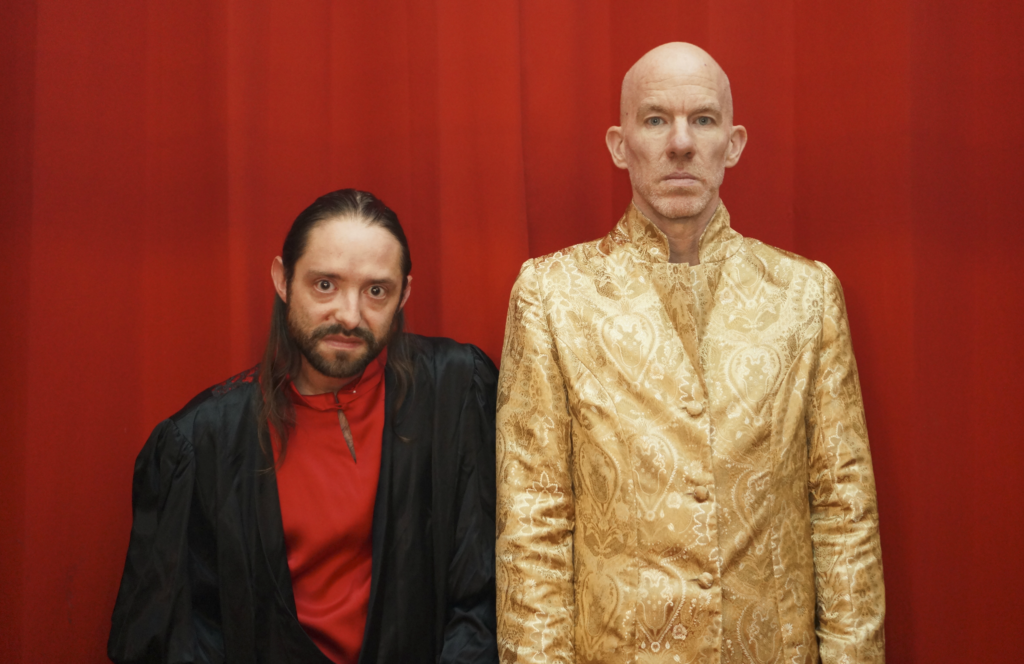Sin, death, and hell have set their marks on Alex Hacker. The Baltimore-based playwright and actor has is preparing for the world premiere of his newest work, His Majestic Lump of Foul Deformity, debuting with his company The Analogue Players later this month. But the play itself was an accidental response when Hacker hit a creative roadblock to a different work (one still in progress) that at present remains unfinished. In a TheatreBloom exclusive interview, we sit down with Alex Hacker and co-star Scott Burke to discuss the process of this bizarre play on Shakespeare’s Richard III.
Thank you both for taking a quick minute out of your busy schedules to sit and discuss this curiously unique show. If you wouldn’t mind giving the readers a quick introduction. Can you tell us, who you are and what you’re doing specifically with this work? That would be a great way to start things off!
Alex Hacker: Oh God. Wait, I have to talk? About myself? What? I don’t even know where to start. I’m Alex Hacker. I’m— wait, what am I doing with this show? I have no fucking idea.
Scott Burke: She asks really good questions.
Alex: That’s actually a really good question, it’s a difficult question to answer.
Scott: Why don’t you start with the play you’ve been working on.
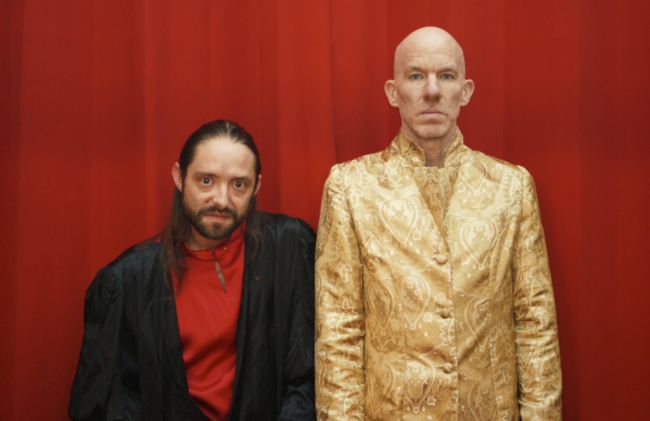
Alex: Okay, so to back up a little bit, I was writing a play about Junius Brutus Booth. It’s a play that I’ve had difficulty finishing. Scott is playing Junius Brutus Booth in that play. As a distraction during that play, it occurred to me that because Junius Brutus Booth has played Richard III I think it was close to 600 times in his life— it was his most famous role and the role he played more than any other Shakespearean role— that it would be fun and a good exercise for Scott to get into character as Junius to actually put on Richard III. Then I started thinking about how to do Richard III. Because Scott and I have riffed as him being Junius Brutus Booth and me being his manager friend, Flynn, and we’ve played that kind of duo a couple times before in various places—
Scott: Like at Degenerate Matter, which is this poetry night that Alex runs up the street at The Wind-Up Space.
Alex: Right. So, long story getting longer…I read through Richard III a couple of times and thought, “I can make this a tw0-man show and we can use that conceit to fuel this riff that has turned into this play, which was fodder for the other play not being finished.” Richard III is a very, very long play. It’s way too long. It needs to be cut. I’ve seen it done a couple of times and it’s just too long and it’s boring and it made me want to fall asleep— and that was a very good professional production. There are just too many extraneous scenes that don’t really do much for the main plot. It’s three hours or longer and that makes it too long. I decided I could bump it down into this two-man show and that’s what we’re doing.
So there’s a little bit of Shakespeare and there’s a little bit of banter between Junius Brutus Booth and his friend Flynn, who is being played by me. We just stripped it down into a 90-minute version of Richard III.
Scott: We’ll see about that. It might end up being closer to an hour and 45.
Alex, you are essentially the playwright, leading co-star, and director?
Alex: Yes. And costumer. Everything that’s not being Junius Brutus Booth.
And when you’re not doing all those things?
Alex: I host the poetry thing. I play drums in a band called Lent. It’s been a while since I’ve been on a stage. But my work is around. AntiKlaus was just performed in it’s fourth—
Scott: Third.
Alex: Right, third incarnation over the holidays, this time with EMP.
Scott: And I was in it every time.
Alex: Yes he was.
Scott: Gotta take credit where credit is due.
Alex: It was fun for me.
Scott: He also wrote Two Suns Over Thebes which was done at Annex, but that was a couple years back.
Alex: That was the last show that I wrote and directed. It was a translation of Euripides The Bacchae and I co-directed it with Mason (Baltimore based theatre artist Mason Ross) and we put it on at Annex when they were still on the corner in The Chicken Box.
I feel like we’ve been talking for a while without actually introducing you, Scott.
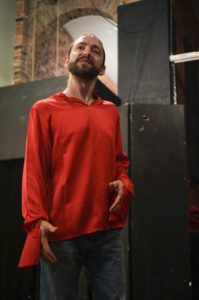
Scott: I do things. I’m Scott Burke. I’ve been doing a lot of Baltimore Theatre stuff. I’ve been doing it for the last five years? First show I was ever in was actually with Alex and it was the first Yellow Sign Theatre show, The System of Doctor Goudron and Professor Plume. He was Goudron. When I read the play that he’s currently writing about Junius Brutus Booth, I immediately thought, “This is awesome. Dude! We need to do this. We need to get this thing rolling!”
Wait a minute. The play that we’re talking about right now— this is not the actual Junius Brutus Booth play.
Scott: Right.
Alex: Yeah. That’s still not finished. It might never be done. But this play that we’re doing is a play that birthed itself from the unfinished play in an attempt to finish the unfinished play—
Scott: An unfinished play that I am 12 pages off-book on. I hold that over his head so that he continues to write it.
Alex: I can’t back out now because he’s too far off-book and too far invested.
Scott: You know, when we started out doing this it was just kind of an exercise. We were just doing scenes from Richard III. But it really has become its own piece. It has a beginning, middle, end; it has an arc. It’s not just us playing scenes from Richard III anymore.
Alex: It did start out as us just playing scenes from Richard III but it’s developed into taking some things out of that and actually trying to use the conceit of these characters— Junius Brutus Booth and Flynn— and not just have it be there for the sake of whatever but to have it be an important part of what is happening. Here are two people from the 19th century who have done this a million times, putting on scenes from this play and having interactions about it as they go and developing another storyline that’s not in your face but is an undercurrent to the actual storyline of Richard III.
Now you’ve mentioned Junius Brutus Booth about a dozen times already. We know he was a real person. Was this Flynn character fictional, something of your creation?
Alex: No. He’s real. He was a theatre owner and a friend of Booth’s. He was sort of an actor-manager, that type of 19th century character. Now much more so than Junius Brutus Booth, I have fictionalized him quite a bit. But he definitely existed. I know that they were in cahoots.
What is the draw to write a play, and then have to write another play to get that play finished, about Junius Brutus Booth? What is it that draws you to him? Why is he so fascinating?
Alex: The first time I read anything about Booth I was working on— what was I working on?
Scott: That truck thing?
Alex: Trevor…
Scott: Trevor?
Alex: Yeah, the one-minute play festival…
Scott: Oh that’s right, I remember that.
Alex: Yeah, one of the one-minute plays there was a prop and it was a biography of John Wilkes Booth. I just picked it up and started reading it. I got about 30 or 40 pages into it and there’s a ten-page section about Junius Brutus Booth, his father. I was immediately fascinated and I knew I wanted to write a play about Junius Brutus Booth. He was debatably the greatest actor of his day, and probably the first great American— well he was from London— but the first totally mesmerizing great actor on the American stage for Shakespeare. And he was certainly the father of an acting dynasty in America. He was also an alcoholic, a vegetarian, and totally insane.
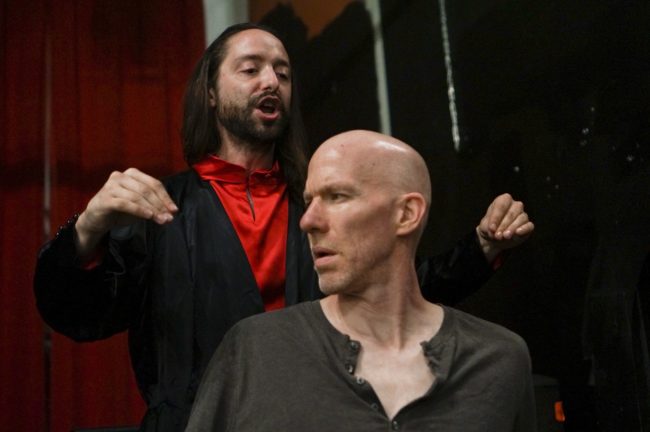
He would have mad fits where he might not show up for a show. During one of them he was found wandering in the woods in character, doing his part to the trees. There are so many anecdotes that have been fun to develop a character for a play out of. Just reading about him I knew this guy had to be put on stage. That’s where the initial idea for my play came from. We’re using some of that to create the mad tragedian who is playing Richard III in this play. The idea of madness and the idea that with Junius Brutus Booth you don’t really know what you’re getting, are definitely a part of the characterization for the actor playing Richard that we’re using for this.
Scott, why are you so enamored with this project?
Scott: I really like Alex’s writing. I read the script and it’s just so good. The lines are so good. Now this is the original play. There are things in it that you just want to say. I love the banter; Alex has created really good banter. And he’s an interesting character. After reading it— and Alex didn’t want me to read anything about Junius. I asked him if I should read a book about him and he said no. He told me this is a fictionalized version of this character, it’s a characterization of who we imagine him being. He’s almost kind of a blowhard. He’s got this thing where he’s a god-damned star, you know, “Get out of my way!” And that relates to the Richard III character in a really interesting way. Where does this man stop and his character begin? It’s useful for play and it’s a challenge. That’s it, the challenge of it. I think that’s what I like about it— it’s a challenge.
Alex, what is the title of the play that you haven’t finished?
Alex: It’s had about five different ones. Right now it’s the Junius Brutus Booth work in progress play.
Scott: Which is not the thing we’re currently putting on.
The thing you’re currently putting on is called what?
Alex: I ended up calling it His Majestic Lump of Foul Deformity. The title is in iambic pentameter.
What would you say has been the biggest challenge for you, Alex, other than finishing the original play, when it comes to what you’re doing with this work?
Alex: The biggest challenge was figuring out how to only use two actors to do a coherent Richard III. There are scenes in the beginning that really lend themselves to that or are already just two characters. But then as the play goes on it got more difficult and I thought “there’s no way, this is impossible, it’s not going to happen.” But at that point I was too far in to back out. I had to sit with it for a week or two and just stew until I figured out a way to get over those hurdles. That was definitely the biggest challenge, just trying to make something coherent by cutting more than half of the original play and having only two actors in a way that would make this work. Hopefully it works.
Scott: I’m dying to see what people think of it!
Now this is technically an Analog Players production, yes? That’s your company, Alex? Does Analog Players have a mission statement?
Alex: No they do not. I think their mission statement— I probably wrote some bullshit on Facebook, I actually don’t know. Analog Players is a plural for a one-man company. It’s whoever is doing whatever work I’m doing at the time that I’m doing it. So there’s no real mission statement.
I was going to ask if this show aligns with your mission statement, but since you don’t have a mission statement, does His Majestic Lump of Foul Deformity align with your reasoning behind having the company?
Alex: Oh yeah, absolutely. Analog is a good word that has multiple meanings and is a good metaphor in certain ways for a kind of theatre, or rather for what I like about the theatre, in terms of doing things. Modern theatre has a lot of rhetoric in its production values that artistically I don’t mind, but they’re just not really things that I’m interested in. I’m not interested in dazzling people with production elements. I’m interested in this sort of stripped-down approach. I’ve seen a number of Richard III productions. Can I take my friend Scott Burke and work this in a way that allows us to tell the story without all of that? I think we’ve done it, well, Scott has definitely done it. Those are the kind of things that I like about the theatre because those are the things that are eternal and real. They never go away. If those things aren’t there, it doesn’t matter what kind of dazzle and lighting and all that that you have going on, I just don’t care and I get lost. I don’t mind those things, like I said, but it’s nice to be down to earth at its most basic.
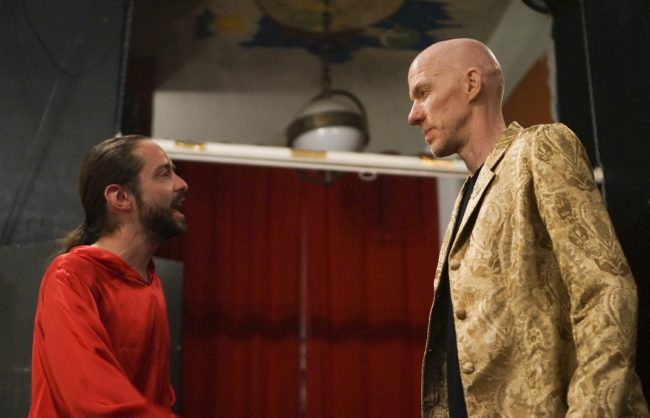
Would you say that this show and what you’re doing with Analog Players is a good fit for the three tenants of Yellow Sign Theatre? And for those unfamiliar with YST’s particular pillars…
- Pop culture is older than you are
- Low art can say things that high art can’t
- The artistic community needs to get the stick out of its ass and stop focusing on a culture’s aspirations and instead focus on practical realities.
Alex: Well…I come at it a little bit differently than Craig (Yellow Sign Theatre Artistic Director Craig Coletta) because my background is in what is considered to be the most elite of the elite highbrow culture. I have a classics degree— a studied Greek and Latin— just the fact that studying Greek and Latin literature is still called classics…I think the first play I did, This Bird’s Flown, it was based on The Iliad while also taking the piss out of it, but also modernizing it in a way that was fun. There is a little bit of me taking the piss out of Shakespeare in this production in the way the play is deconstructed and then in the way that it is commented on as we go through the play. I find that really fun and I hope that translates to an audience.
I find that there’s a certain element of our culture where people still say “Oh, Shakespeare. Oh, an author.” What we do first is, and I believe this to a degree, but we believe in what the author is. But in the end I know enough about Shakespeare to know that he just completely raped the shit out of ancient culture and made it his own. Did he take Plautus’ play and go, “Hey this play I wrote? I took everything structurally— well actually I took everything straight out of his play.” No. He said “Hey, I made a new play, here you go.” Is Plautus ever mentioned or given credit? No.
I think that in elite culture we have a tendency to treat these things in a way that actually comes out of fandom, but it’s just too much like this stuff being untouchable. And creatively that bores the shit out of me. In the end, I have no real interest in putting on an actual production of Richard III. For one brief moment I thought, “we’re going to do Richard III as an actual production with Shakespeare’s text complete and intact and we’ll be true to the text.” That moment was very brief. I have no interest in doing that. Creatively, once I get into something? I want to fuck with it.
What is it that you are hoping people will take away from this experience?
Scott: Uh, I don’t know.
Alex: The best Richard III that’s ever been put on stage?
Scott: The best Richard III. That is it!
Alex: I mean, come on. We did you a favor. We cut an hour and a half and we’ve turned it into this brisk movie-like 90-minute theatre show. We took out all the boring parts and all the boring characters and streamlined it into this, which I think does give a good portrait of Richard. It allows us to put a lot of humor in it and hopefully tighten up some of the major important themes in the play that I wanted to focus on.
Scott: God damn it, Flynn! I just hope people take away from it that I’m a God damned genius. God damn it!
Alex: Thank you, Junius.
Scott, you’re only playing Junius Brutus Booth, does that mean that Alex you’re playing—
Alex: Everybody else. Including the women. I’ll be playing Lady Ann. It’s fun and it’s extraordinarily liberating.
Scott: Aw, yes! When you see me woo this man…well this man as a woman. When you see me woo Lady Ann…I woo the hell out of him, let me tell you!
Alex: It’s super fun and great.
Isn’t that exhausting for you, though, Alex?
Alex: I wouldn’t say exhausting. I feel like the energy that has to go into— I don’t even know how many characters I play— but it’s at least two women and maybe a half dozen or so men— the energy has to be there to make that work. I was down at DuBois Textiles doing some costuming, and every single piece of costuming we have for the show is actually made for women. There is not a single piece of male attire in this show. That’s the beauty of costuming a Renaissance show. Just go to the woman’s section and there you go.
Scott: I’ve just had a thought that I’d like to add as an addendum going back to when you asked me why I liked that character. Can I do that here?
Sure, Scott. What is it that you like about the Junius Brutus Booth character?
Scott: I think the character that Alex has created, what interests me in that character? He’s a man who has to live in fiction because he can’t deal with the real world. I can identify with it.
That’s actually a beautiful segue for the next question which goes a little along the lines of what are you bringing to the character versus what is the character bringing to you?
Scott: I can relate to both characters and that’s kind of scary.
Alex: Wait, are you talking about Junius and Richard?
Scott: Yeah. That is scary. Right?
Alex: I’ve created a monster. Well, I’ve created two monsters.
Scott: If you’re going to play something you have to be able to empathize. It’s the only way to remember the lines. You should be able to empathize with them. I totally empathize with both of those characters. I can understand being— well not deformed, but being a person who is different.
Having your own short comings…
Scott: Shortcomings— oh I hear you. Indeed. Short. Right? Actually, Junius Brutus was a little low in stature, which was one of the reasons why Alex asked me to play him. But it’s one of those things, you can feel kind of left out and “deformed” when people see you in not such a great light. It makes you want to prove yourself more. “I’ll beat them! I’ll show them that I’m better than them.” I think that’s what Richard embodies and that’s an interesting character. I like him.
Alex: Hopefully what I’m bringing to Flynn in some sense is in many ways a counter to most of Richard’s negative characteristics.
Scott: He’s the nice guy.
Alex: Supposedly the nice guy. Hopefully I’m bringing a sense of humor as Flynn, a sense of humor within the characters that he’s playing. Hopefully some sense of empathy in there somewhere, and definitely to a degree I need to be playing up a certain effeminacy that Richard’s characteristics are antagonistic towards, not just to play against him but to get under his skin a little bit. I’m definitely the foil.
Scott: There’s lots of duality here. You can play around with all those binaries like male-female, power-submission, that sort of thing.
Now, I’ve been told that if Scott doesn’t hate a show then it’s not a good show. Do you hate the show yet?
Scott: Give me a couple of weeks. I’m getting there. It usually happens about a week and a half to two weeks before the show opens. We’ve still got a couple of weeks before I hate it.
Alex: I’ve already been there.
What would you say taking on a project like this has taught you about yourselves?
Alex: For me, performance wise…I think for both of us though I certainly won’t speak for Scott, this is certainly the largest project I’ve taken on. I’ve done a little bit of acting but not as much as I’ve done writing and directing. I’ve never had a part or parts that— I’ve just never done anything like this. I think the challenge from the get-go for both of us, but definitely for me has been the challenge of acting. The challenge of having a 90-minute two-man show that you have to be on for—
Scott: On stage the entire time. There is no break.
Alex: There is no downtime. We’ve never done anything like that.
Scott: I’ve actually never done Shakespeare. So this is the first time I’m doing a Shakespeare.
Alex: Neither of us have done Shakespeare, actually.
Scott: Yeah. I only recently got into doing theater over the last five years as an adult living in the city. I never was trained, I never did Shakespeare, and that’s actually another challenge.
What would you say is the moment in the show that defines the show for you?
Alex: There are a couple and without giving anything away, I’ll say there are moments in which the original text and plot of Shakespeare’s play are altered to one degree or another. I can’t really say anymore without giving something away.
Scott: The thing that most stands out? The end. But I can’t spoil it.
Alex: That’s one of those moments I was talking about. We can’t get into it. See? Already going too far—
Scott: No, you went too far. You were the one who—
Alex: You went too far, JB!
Scott: I wasn’t even referring to— I was just referring to the feeling— not even the big where we change the text. I don’t know! The thing. The idea, God damn it. And leave that out! Don’t put that in there. God damn it.
Alex: I don’t think we actually gave anything away. We’re good here. Did we give anything away?
I think the only thing you gave away was the fact that you two might actually be insane…but that’s a good tie-in for the question I forgot earlier. You had mentioned madness playing into this work, are you using madness as a lens to set the framework for your show?
Alex: Hmm. I wouldn’t say to set the framework but more as a tool to bring out, enhance, and play with certain themes that I think are already in the original text of Richard III. Obviously Richard III was in some sense a mad man. Junius Brutus Booth was, in a different sense, and kind of almost in the opposite sense, also a mad man. I think off-stage he was a very mild mannered, intelligent person. He was an alcoholic who had moments of madness. He was also a vegetarian. He had a very spiritual belief that animals had souls and he didn’t want to eat them because of that. His vegetarianism was what we would consider to be mad. And they did in the 19th century too.
Scott: Yeah to have that idea in the 19th century that was definitely the sign of a mad man. He was more than humanistic.
Alex: The kind of eccentric person he was really lends itself to that madness. But their two madnesses comes together in a way that I found very interesting to play with. An actor in those days was somebody who had multiple parts running around in their head at all times. How many different parts did Junius Brutus Booth, as a professional actor itinerant actor, have in his head that he could just jump right into on any given day? 40? Maybe 50? For someone of his sensitivity, I think that that played into his personality quite a bit. I play with that in this piece.
How do you think the dynamic of this show would shift if you two were to switch roles?
Scott: Huh. That would be interesting. You know what? No. It wouldn’t be the same. He’s too tall. Alex is too tall. Richard has to be short. Right? Do not take the only roles that are designed for me away from me! But I mean— just to see that performed on stage— you couldn’t pull that off— well he couldn’t. Because he’s too tall. It would just be weird.
Alex: I definitely considered playing Junius in the original play. That thought has crossed my mind during the process, I’ve been working on that play on and off for two years. There have definitely been times when I have though, “Oh, I’ll do this.” Scott totally put that idea to rest. He’s just better at it. We started acting together in that Yellow Sign production. And then he was in my first full-length play This Bird’s Flown, also at Yellow Sign, we’ve just done a lot of shows together. I’ve seen him grow as an actor over the course of those five years in an impressive way that made me want to work with him on this show.
Scott: He’s so sweet to me. He’s so good to me.
If you had to sum up the experience from your perspective in just one word?
Scott: Scary.
Alex: Mad.
Scott: You asked him earlier— actually I think you asked us both and I just never answered, but what as a performer did we learn from this experience? I learned that not even just as a performer, but as a person? I need to be nicer. Here I am playing Richard III and I realize I empathize with some of it. Actually, I empathize with a lot of it. Oh, I need to stop being an asshole. I think that’s what I’ve learned from this. I think I identify too much with Richard III.
Why do you want people to tie up 90 minutes of their time here in Station North to come and see this show?
Alex: Because it’s going to be fun. We’re having a good time.
Scott: It’s going to leave an impression.
Alex: I think we can translate and project that good time onto an audience. I’m fairly confident we can do that. It’s going to be fun for people to watch.
Scott: There is something to be said for stripping theatre down to its most basic. There are no sets in this show.
Alex: This is kind of close to original Shakespeare, no sets, black box. The costumes are fantastic, though.
Scott: There is something to be said for two people just doing characters as theatre and I think that will interest people.
Alex: And it works really well for this show. I was in a class doing Richard III monologue, how does that start, Richard?
Scott: Oh. Oh, oh— o, coward conscience, how dost thou afflict me!
Alex: That famous one. While I was working on that— and this was way before we ever got started on this show— I wanted to give that monologue to the audience. There is a decent amount of audience interaction— well not interaction, but the audience is brought into the show.
Scott: There are a lot of asides in Richard III.
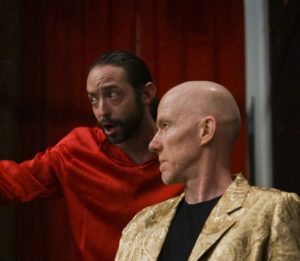
Alex: This play in particular, being a relatively early Shakespeare play, there is so much of that. So when we strip it down to this two-man show, it’s just so easy to decide how to direct those moments. “Okay, the audience is being brought in here, or here” and that whole process has just been really fun. Focusing on that acting, what we’re giving to the audience instead of having to focus on needing lights and all the other modern elements that you would normally bring into a show. It’s been really nice to just focus on those basic components of Shakespearean acting and those elements of a Shakespearean production and hopefully drive them home.
Anything else you’d like to say about the experience? The process? The fact that you haven’t killed each other yet?
Alex: We indeed have not killed each other yet.
Scott: Flynn, what would you do without me? What would you do?
Alex: I would be lost.
Scott: See? He would be lost.
Alex: Let’s start over. I think we need to redo this last hour.
Scott: Shit. Have we been here for an hour?
Alex: Oh Jesus, that’s plenty to wheedle down into something intelligible. Come see our show!
His Majestic Lump of Foul Deformity opens on September 23, 2016 with The Analog Players and runs through October 2, 2016 at The Yellow Sign Theatre— 1726 N. Charles Street in the Station North Arts District of Baltimore, MD. Tickets are available for purchase at the door and in advance online.

